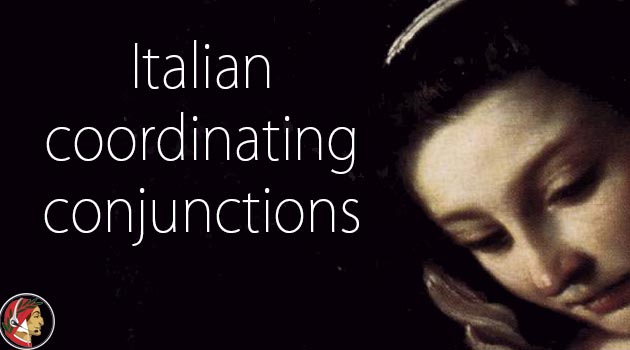Le congiunzioni, Italian coordinating conjunctions, connect sentences, parts of the same sentence or other groups of words.
Italian conjunctions, prepositions and pronouns, are all connectors, or connettivi in Italian. Congiunzioni connect different elements of a sentence. I already mentioned the role of the simple prepositions, or preposizioni semplici, and the difference between prepositions and conjunctions. Please have a look if you have doubts.
Italian conjunctions can be of two types, coordinating or subordinating (coordinanti o subordinanti), depending on the relation between the words they connect. Today we are going to see coordinating conjunctions. Sounds difficult? Let’s see some examples.
* All the examples will be in Italian. Please make and effort and try to understand the sentences. Add questions or suggestions in the comments if you wish.
Congiunzioni coordinanti
If words or clauses linked by a conjunction have the same weight and function, we talk about coordinating conjunctions. For example:
- Subjects: Mario e Luigi sono due idraulici.
- Objects: Ho mangiato il pane e il formaggio.
- Adjectives: Voglio una maglietta rossa o verde.
If we simply look at the structure of conjunctions, we can identify 3 types.
- Simple, just one word: Vuoi il caffè o il cappuccino?
- Compound, two words form one: Ho fame perché (per + che) non ho mangiato.
- Expressions working as conjunctions: Torno a casa visto che è tardi.
Now, we are going to see some examples of coordinating conjunctions based on their function.
Copulative
When a conjunction simply puts together “a couple” of words or sentences, we have a congiunzione copulativa.
- e – Abbiamo incontrato Stefano e Claudia.
- anche – Vieni anche tu al cinema?
- e anche – Ho telefonato a tua sorella e anche a tuo fratello.
- pure – Hai visto pure tu la partita della Juventus?
- né – Stasera non ho mangiato né bevuto.
- neanche – Non ho neanche un euro!
- neppure – In albergo non funziona la doccia, e neppure l’aria condizionata.
- nemmeno – Se non vai in piscina, non ci vado nemmeno io.
Avversative
When a conjunction links two opposite words or situations, we have a congiunzione avversativa.
- ma – Mio padre ha molti soldi, ma non vuole spenderne mai.
- d’altra parte – Non mi piace lavorare in ufficio, d’altra parte devo pagare l’affitto.
- tuttavia – Sei sempre stato poco gentile con me, tuttavia ti aiuterò.
- ciò nonostante – La mia squadra ha perso l’ultima partita, ciò nonostante ha vinto il campionato.
- però – Nevica, però non fa molto freddo.
- eppure – Faccio del mio meglio per cucinare bene, eppure i miei piatti sono pessimi.
- anzi – Vorrei una casa al mare anzi due!
- nonostante – La città è piena di gente nonostante il freddo.
- bensì – Il signor Rossi non è mio zio bensì mio cugino.
- invece – Pensavo di avere il serbatoio pieno di benzina, invece era quasi vuoto.
- mentre – Le mie due figlie sono bionde mentre mio figlio ha i capelli neri.
- al contrario – Io non ho finito l’università, al contrario di te.
Disgiuntive
When the conjunction creates an alternative between opposite words or sentences, we have a congiunzione disguintiva.
- o – Preferisci la carne o il pesce?
- oppure – Sei venuto in macchina oppure in treno?
- altrimenti – Per favore, compra del pane altrimenti lo compro io.
- ossia – Adoro l’entomologia, ossia lo studio degli insetti.
Dichiarative
They link a statement and an explanation (or declaration).
- cioè – Ci vediamo il 19 agosto, cioè mercoledì prossimo.
- infatti – Non mi piace Maurizio, infatti non andrò alla sua festa.
- difatti – Il coltello di ceramica era molto fragile, difatti si è rotto.
- ossia – Marina è la moglie di mio fratello, ossia mia cognata.
- vale a dire – Tua madre ha la stessa età della mia, vale a dire sessant’anni.
- in altre parole – Abbiamo deciso di vivere insieme, in altre parole ci sposeremo presto.
- in effetti – Mi sembravi stanco e in effetti il tuo lavoro non andava bene.
- in realtà – Sembrava che Flavio non avesse studiato ma in realtà si è impegnato molto.
Correlative
They work in couples and build a correlation between two elements.
- o… o – O vendi la macchina, o la moto.
- né… né . Non voglio né l’insalata verde, né gli spinaci.
- sia… sia – Siete ridicoli, sia tu sia i tuoi amici.
- tanto… quanto – Ho tanto bisogno di te, quanto tu ne hai di me.
- tale… tale – tale padre, tale figlio.
- sia che… sia che… Devi finire i broccoli, sia che ti piacciano, sia che non ti piacciano!
Conclusive
When a conjunction introduces the conclusion of a sentence , we have a congiunzione conclusiva.
- inoltre – Voglio dirti inoltre che sabato la scuola sarà chiusa.
- quindi – Oggi è venerdì quindi ci vediamo tutti per un aperitivo.
- insomma – Avevo finito i soldi, insomma ero disperato.
- allora – Volevo studiare qualcosa di interessante, allora ho scelto la storia romana.
- dunque – I tuoi amici sono arrivati, dunque possiamo iniziare la festa.
- per cui – La lavatrice si è rotta, per cui ho chiamato il tecnico.
- cosicché – Sono tornato a casa tardi, cosicchè non ho potuto mangiare.
- perciò – Giulio è malato, perciò non può venire stasera.
- pertanto – Adesso è già agosto, pertanto le giornate presto si accorceranno.
- così – Ho pensato a te, così ti ho telefonato.
- sicché – Non ho guardato l’orologio, sicché ho perso il treno.
Again, all the congiunzioni above connect elements that are independent of each other or sentences which can well stand alone. We’ll see pretty soon the congiunzioni subordinanti.
Thanks for reading. Please try the quiz and check your level.

